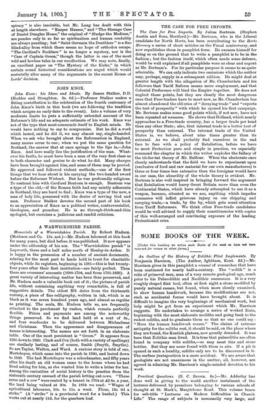John Knox : his Ideas and Ideals. By James Stalker,
D.D. (Hodder and Stoughton. 3s. 6d.)—Professor Stalker makes a fitting contribution to the celebration of the fourth centenary of John Knox's birth in this book (we are following the tradition which assigns an early date to the event). Into a volume of very moderate limits he puts a sufficiently extended account of the Reformer's life and an adequate estimate of his work. Knox was not of the type that most commends itself to English minds. He would have nothing to say to compromise. But he did a work which lasted, and he did it, we may almost say, single-handed. When we ask who brought about the Reformation in England, many names occur to one; when we put the same question for Scotland, the answer that at once springs to the lips is,—John Knox. And hero really lies the justification of the man. What- ever his faults, ho must have been a man of the very first class as to both character and genius to do what he did Many charges have been brought against him, and some of them may be proved. He approved and followed violent methods,—one of the first things that we hear about is his carrying the two-handed sword before the Reformer Wishart. But he was profoundly religious. To contrast him with Cardinal Beatoun is enough. Beatoun was a type of the old,—if the Roman faith had any saintly adherents in Scotland, they are hard to find ; Knox was a type of the new, a man of holy life, possessed with the desire of serving God and man. Professor Stalker devotes the second part of his book to an appreciation of Knox as a political writer, controversialist, theologian, and preacher. He is no through-thick-and-thin apologist, but exercises a judicious and candid criticism.






































 Previous page
Previous page